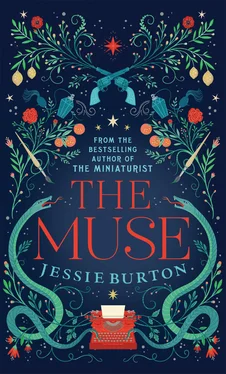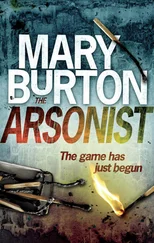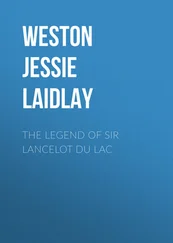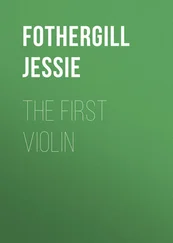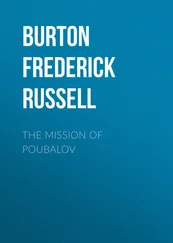Oblivious rabbits hopped across the orchard and far off in the hills goats were being herded, the bells on their necks clanking atonally and out of rhythm, a calming sound because it lacked any conscious performance. A hunter’s gun rang out, and birds rose in chaos against the baroque Andalusian morning. Sarah did not stir, but the rabbits scattered, expert hiders, deserting the surface of the waiting earth. Olive closed the windows and the curtains dropped. Her mother probably hoped her long-sought tranquillity was to be found here — but there was a wildness under the tolling convent bell, the chance of wolves in the mountains. The futile yaps of a dog in a barn would puncture every silence. And yet, since their arrival, Olive personally found the landscape and the house itself energizing, in a way that was unfamiliar and wholly unexpected. She had taken an old wood panel that she’d found in the outhouse at the end of the orchard, carrying it up to the attic as if it was contraband. She had treated it in readiness for paint; but it remained blank.
Her father strode into the room, his large foot skidding a Vogue under the bed. Olive jammed the letter in her pyjama pocket and spun round to face him. ‘How many?’ he asked, pointing at the sleeping figure of his wife.
‘Don’t know,’ said Olive. ‘But more than normal, I think.’
‘ Sheiße .’ Harold only swore in German in moments of great stress or great freedom. He loomed over Sarah and lifted a stray strand of hair delicately off her face. It was a gesture from another time, and it made Olive squeamish.
‘Did you get your cigarettes?’ she asked him.
‘Eh?’
‘Your cigarettes .’ Last night, he’d mentioned needing to get cigarettes from Malaga and visiting an artist’s studio — hoping to sniff out another Picasso, he’d said, laughing, as if lightning really did strike in the same place twice. Her father always seemed to slip out of the days like this — bored quickly, yet demanding an audience whenever he turned up again. They’d barely been here two days, and already he was off.
‘Oh,’ he said. ‘Yes. They’re in the car.’
Before he left his wife’s room, Harold poured his beloved a glass of water and left it by her bedside, just beyond the orbit of her reach.
*
Downstairs, the shutters were still half-closed and the minimal furniture was in shadow. The air had a tinge of camphor laced with old cigar smoke. The finca could not have been lived in for several years, Olive supposed. A large catacomb above the ground, each of its rooms reticent at her presence, long corridors furnished in colonial habits, dark hardwood cabinets empty of homely objects. It felt like everything was as it had been in the 1890s, and they were characters out of time, surrounded by the discarded props of a drawing-room play.
The vague moisture in the air was already evaporating. Olive threw open the shutters and sunlight bleached the room, a day of exposure but no warmth. The view was an uncultivated slope, which led down to the high wrought-iron fence and onwards, to the beginnings of the village road. She looked out; scraggy bushes and empty flower borders, three fruitless orange trees. Her father had said these mansions were always built outside the villages, near to well-irrigated and lush earth, where in summer, he declared, they would enjoy olive groves and cherry blossom, flower gardens of dama-de-noche and jacaranda, fountains and leisure and happiness, happiness.
Olive still had on her winter pyjamas and stockings, and an Aran jumper. The flagstones were so cool, it felt as if rain had just fallen on their large smooth squares. Just do it , she thought. Tell him you’ve got a place, and go . If only it was easy to act on thoughts. If only it was easier to know what was the best thing to do.
In the pantry, she discovered a tin of coffee beans and an old but functioning grinder. It was all there was for breakfast, and she and her father decided to drink it on the veranda at the back of the house. Harold went to the room where the telephone was. He had chosen this finca as it was the only one hooked up to a generator, but it was a surprise they had a telephone, and Harold was very pleased.
He was murmuring in German, probably to one of his friends in Vienna. He sounded insistent, but he was too quiet for her to make out the words. When they’d been in London, and he’d had news of what was happening in his home city — the street fights, the hijacked prayer meetings — he would plunge into dark silences. As she ground the beans, Olive thought of her childhood Vienna, the old and the new, the Jewish and the Christian, the educated and the curious, the psyche and the heart. When Harold said it was not safe for them to return, Olive could not quite take this in. In the circles they moved, the violence seemed so distant.
He’d finished his conversation and was sat on the veranda waiting for her, on a tatty green sofa someone had left out in the open air. Over his coat, he was wearing a long spindly scarf that Sarah had knitted, and he was frowning over his correspondence. He always had a knack of making sure that his post would be waiting for him, wherever they landed.
Olive lowered herself into a discarded rocking chair, hesitating for fear damp had weakened the glue, woodworm seeing to the joints. Her father lit a cigarette and placed his silver box on the flaking veranda floor. He sucked on the tobacco leaf, and Olive heard the satisfying crackle as his breath intensified the heat.
‘How long do you think we’ll be here?’ she asked, trying to sound casual.
He looked up from his letters. A thin line of smoke rose straight from the cigarette tip, no breeze up here to shift its journey. The column of ash accumulated, curving downwards and scattering onto the peeling boards. ‘Don’t tell me you already want to leave.’ He raised his dark brows. ‘Are you — ’ here, he sought the particularly English word — ‘ pining ? Is there someone we left behind in London?’
Olive stared listlessly at the January-thin orchard, briefly wishing that there was some chinless Geoffrey, with a white stucco house in South Kensington and a job at the Foreign Office as an under-secretary. But there was no one, and there never had been. She closed her eyes and could almost see the dull metal wink of imaginary cufflinks. ‘No. It’s just — we’re in the middle of nowhere.’
He laid the letter down and regarded her. ‘Livvi, what was I supposed to do? I couldn’t leave you on your own. Your mother—’
‘I could have been left on my own. Or with a friend.’
‘You always tell me you don’t have any friends.’
‘There’s — things I want to do.’
‘Like what?’
She touched her pyjama pocket. ‘Nothing. Nothing important.’
‘You never made much of London anyway.’
Olive did not reply, for her eye had been caught by two people standing in the orchard, waiting at the fountain that lay beyond the immediate ribbon of grass that surrounded the house. It was a man and a woman, and they made no effort to hide themselves. The woman was wearing a satchel against her body, and she seemed at one in this garden, the canes in the parched earth the only remnant of the tomatoes, aubergines and lettuces that must have thrived here once, when someone cared.
The man had both his hands stuffed in his pockets, his shoulders hunched, chin down, but the woman stared up at the muscular satyr in the fountain, poised with his empty canton. She closed her eyes, breathing in the air. Olive breathed too, the faint wafts of charcoal fire and fields of sage, the emptiness of this place, its sense of desolation. She wondered if there was a means to get that water flowing.
Читать дальше
